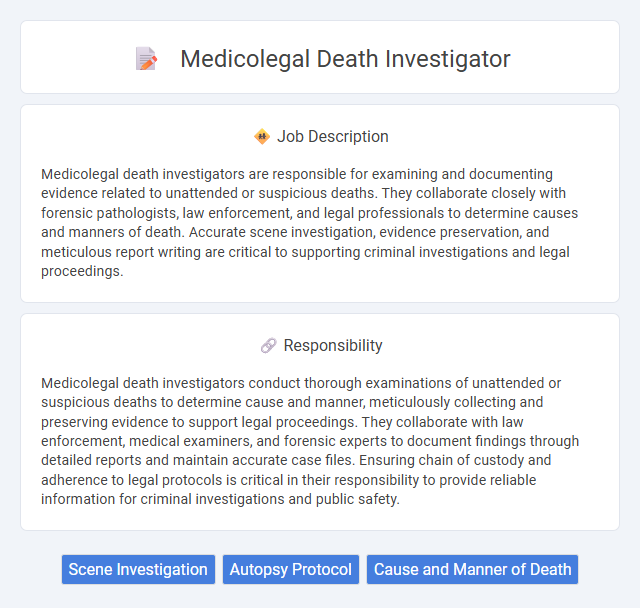
Medicolegal death investigators are responsible for examining and documenting evidence related to unattended or suspicious deaths. They collaborate closely with forensic pathologists, law enforcement, and legal professionals to determine causes and manners of death. Accurate scene investigation, evidence preservation, and meticulous report writing are critical to supporting criminal investigations and legal proceedings.
Individuals with a strong ability to handle high-stress situations and maintain emotional resilience are likely suitable for a Medicolegal Death Investigator role. Those prone to anxiety or discomfort with graphic scenes may find the constant exposure challenging. A natural curiosity, attention to detail, and a commitment to upholding legal and medical standards increase the probability of success in this demanding field.
Qualification
A Medicolegal Death Investigator must have a bachelor's degree in forensic science, criminal justice, or a related field, with many employers preferring candidates with specialized training in death investigation or forensic pathology. Certification from organizations such as the American Board of Medicolegal Death Investigators (ABMDI) is often required, along with experience in law enforcement, emergency response, or mortuary science. Strong knowledge of anatomy, forensic techniques, and legal procedures is essential to accurately determine cause and manner of death.
Responsibility
Medicolegal death investigators conduct thorough examinations of unattended or suspicious deaths to determine cause and manner, meticulously collecting and preserving evidence to support legal proceedings. They collaborate with law enforcement, medical examiners, and forensic experts to document findings through detailed reports and maintain accurate case files. Ensuring chain of custody and adherence to legal protocols is critical in their responsibility to provide reliable information for criminal investigations and public safety.
Benefit
Medicolegal death investigator jobs likely offer substantial benefits such as comprehensive health insurance, retirement plans, and paid leave, providing financial security and work-life balance. Employees may benefit from specialized training opportunities, which could enhance career advancement and expertise in forensic science. The role often includes the probability of job stability within government agencies, ensuring consistent employment and potential pension benefits.
Challenge
The role of a Medicolegal Death Investigator likely involves complex challenges, including accurately determining cause and manner of death amid incomplete or conflicting evidence. The investigator must probably navigate emotionally charged environments while maintaining objectivity and attention to detail. High-pressure decision-making and collaboration with law enforcement and medical professionals could also contribute to the job's difficulty.
Career Advancement
Medicolegal death investigators can advance their careers by gaining specialized certifications such as the American Board of Medicolegal Death Investigators (ABMDI) credential. Opportunities for promotion often include supervisory roles, forensic consultant positions, or transitioning into related fields like forensic pathology or law enforcement. Continuing education in forensic science, criminal justice, and anatomy enhances qualifications and opens pathways to leadership and expert witness roles.
Key Terms
Scene Investigation
Medicolegal death investigators play a critical role in scene investigation by meticulously documenting evidence and evaluating the circumstances surrounding sudden or unexplained deaths. They collect physical evidence, photograph scenes, and collaborate with law enforcement to reconstruct events, ensuring accurate cause of death determinations. Their expertise in forensic analysis and adherence to legal protocols helps preserve the integrity of investigations for court proceedings.
Autopsy Protocol
Medicolegal death investigators play a critical role in the autopsy protocol by meticulously documenting the scene, collecting physical evidence, and recording detailed observations that support the medical examiner's findings. Their comprehensive reports ensure accurate determination of cause and manner of death, facilitating legal proceedings and public health data collection. Mastery of forensic pathology terminology and evidence chain-of-custody procedures is essential for the precise execution of autopsy protocols.
Cause and Manner of Death
Medicolegal death investigators play a crucial role in determining the cause and manner of death by meticulously examining the circumstances, medical history, and forensic evidence of deceased individuals. They collaborate with forensic pathologists and law enforcement to classify deaths as natural, accidental, homicidal, suicidal, or undetermined based on autopsy results and investigative findings. Accurate identification of cause and manner of death supports legal proceedings, public health initiatives, and the resolution of unanswered deaths.
 kuljobs.com
kuljobs.com